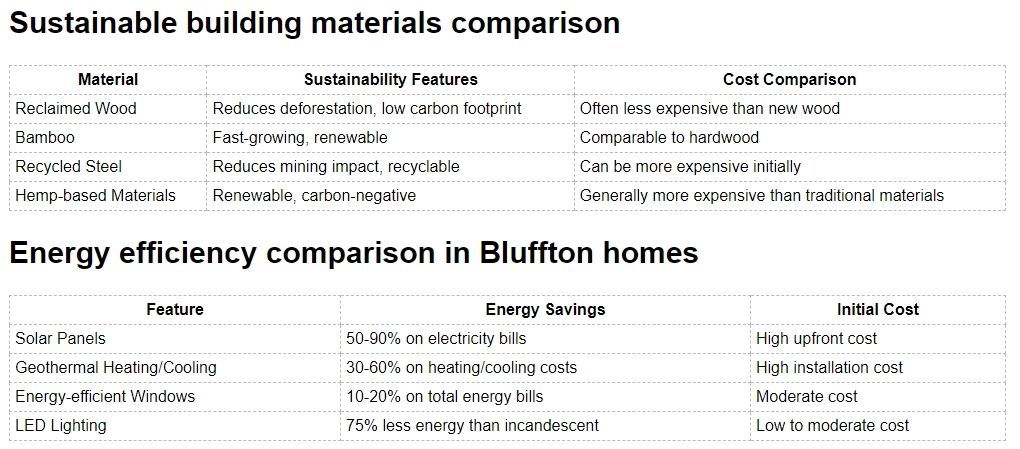Sustainable building practices are methods and techniques used in construction to reduce environmental impact and create more energy-efficient structures. These practices are becoming increasingly popular in Bluffton, South Carolina, as homeowners and builders recognize the long-term benefits of eco-friendly construction.
Key takeaways
- Sustainable building focuses on reducing environmental impact and increasing energy efficiency
- Local materials like reclaimed wood are popular in Bluffton sustainable construction
- Energy-efficient systems such as solar panels and geothermal heating are gaining traction
- Water conservation methods are especially important in coastal Bluffton
- Indoor air quality is a key consideration in sustainable home design
- Cost savings over time are a major benefit of sustainable building practices
Understanding sustainable building in Bluffton
Sustainable building in Bluffton takes into account the unique coastal environment and local resources. The goal is to create homes that are not only environmentally friendly but also resilient to the area's climate challenges, such as hurricanes and flooding.
Many Bluffton builders are incorporating sustainable practices into their work. These methods often use local materials, reduce waste, and create homes that are more energy-efficient and comfortable for residents.
Local materials for sustainable construction
One of the key aspects of sustainable building in Bluffton is the use of local materials. This reduces transportation costs and supports the local economy. Some popular local materials include:
Reclaimed wood
Bluffton's history as a lumber town means there's plenty of reclaimed wood available. This wood, often from old barns or demolished buildings, can be used for flooring, beams, and decorative elements.
Oyster shells
Given Bluffton's coastal location, oyster shells are plentiful. These can be used in landscaping or even as a component in concrete mixes, adding a unique local touch to sustainable homes.
Native plants
Using native plants in landscaping reduces water needs and supports local ecosystems. Plants like sweetgrass and palmetto are not only sustainable choices but also add to the Lowcountry aesthetic.
Energy efficiency in Bluffton homes
Energy efficiency is a crucial part of sustainable building. In Bluffton's hot and humid climate, this often focuses on cooling and dehumidification. Some common energy-efficient practices include:
Solar power
With Bluffton's sunny climate, solar panels are an increasingly popular choice for sustainable homes. They can significantly reduce electricity bills and dependence on the grid.
Geothermal heating and cooling
Some Bluffton homes are using geothermal systems, which take advantage of the constant temperature underground to heat and cool homes more efficiently.
Proper insulation
Good insulation is crucial in Bluffton's climate. Sustainable homes often use high-quality insulation materials to keep cool air in during the hot summers and warm air in during the mild winters.
Water conservation methods
Water conservation is particularly important in coastal areas like Bluffton. Sustainable homes often incorporate:
Rainwater harvesting
Systems to collect and store rainwater for irrigation and other non-potable uses are becoming more common in Bluffton sustainable homes.
Low-flow fixtures
Water-saving faucets, showerheads, and toilets can significantly reduce water usage without sacrificing comfort.
Native landscaping
Using plants adapted to Bluffton's climate reduces the need for irrigation, saving water and maintenance time.
Indoor air quality considerations
Creating a healthy indoor environment is a key aspect of sustainable building. In Bluffton's humid climate, this often involves:
Proper ventilation
Good ventilation systems help control humidity and remove indoor pollutants, creating a healthier living environment.
Low-VOC materials
Using paints, adhesives, and other materials with low volatile organic compounds (VOCs) helps maintain good indoor air quality.
Mold prevention
Given Bluffton's humid climate, sustainable homes often incorporate design features and materials that resist mold growth.
Cost considerations for sustainable building
While sustainable building practices can have higher upfront costs, they often lead to significant savings over time. Bluffton homeowners considering sustainable building should consider:
Long-term energy savings
Energy-efficient homes have lower utility bills, which can offset higher initial costs over time.
Increased home value
Sustainable features can increase a home's value, which is particularly relevant in Bluffton's competitive real estate market.
Potential tax incentives
There may be local or state tax incentives available for certain sustainable building practices in South Carolina.
Sustainable building and Bluffton's environment
Sustainable building practices in Bluffton not only benefit individual homeowners but also contribute to preserving the area's natural beauty. By reducing energy use and minimizing waste, these practices help protect Bluffton's ecosystems, including its marshes and rivers.
Challenges of sustainable building in Bluffton
While sustainable building is gaining popularity in Bluffton, it does face some challenges:
Climate considerations
Bluffton's hot, humid climate and potential for hurricanes require careful planning for sustainable homes to be both eco-friendly and resilient.
Building codes
While Bluffton and South Carolina have some green building initiatives, navigating building codes can sometimes be challenging for innovative sustainable designs.
Availability of materials
While many sustainable materials are available locally, some specialized eco-friendly products may need to be sourced from further afield.
Future of sustainable building in Bluffton
As awareness of environmental issues grows and technology advances, sustainable building practices are likely to become even more common in Bluffton. Future trends may include:
Smart home technology
Integrating smart systems to further improve energy efficiency and comfort.
Net-zero homes
More homes that produce as much energy as they consume over the course of a year.
Resilient design
Increased focus on designing homes that can withstand extreme weather events, which may become more frequent due to climate change.
Sustainable building certifications
Several certifications are available for sustainable homes in Bluffton:
LEED certification
Leadership in Energy and Environmental Design (LEED) is a widely recognized green building certification program.
Energy Star certification
This certification indicates that a home meets strict energy efficiency guidelines set by the U.S. Environmental Protection Agency and Department of Energy.
Local certifications
Some local programs in South Carolina also offer green building certifications.
Finding sustainable builders in Bluffton
For homeowners interested in sustainable building, finding the right builder is crucial. Some tips for finding sustainable builders in Bluffton include:
Check for certifications
Look for builders with green building certifications or experience with sustainable projects.
Ask for references
Talk to previous clients about their experience with the builder and the performance of their sustainable homes.
Visit sustainable homes
Many builders offer tours of completed sustainable homes, which can give you a good idea of their work.
Sustainable renovations for existing Bluffton homes
Sustainable building practices aren't just for new construction. Many existing homes in Bluffton can benefit from sustainable renovations, such as:
Energy audits
Professional energy audits can identify areas where homes can improve their energy efficiency.
Upgrading insulation
Adding or improving insulation can make a big difference in a home's energy use, especially in older Bluffton homes.
Installing energy-efficient appliances
Replacing old appliances with energy-efficient models can reduce energy use and costs.
Community impact of sustainable building
Sustainable building practices can have a positive impact on the Bluffton community as a whole:
Job creation
The sustainable building industry can create new jobs in the area.
Environmental preservation
By reducing resource use and pollution, sustainable homes help preserve Bluffton's natural beauty.
Education
Sustainable homes can serve as educational tools, raising awareness about environmental issues in the community.

Sustainable landscaping practices for Bluffton homes
- Use native plants adapted to Bluffton's climate
- Implement rainwater harvesting systems
- Create wildlife-friendly habitats
- Use permeable paving to reduce runoff
- Compost yard waste to create natural fertilizer
- Install drip irrigation for water efficiency
Conclusion
Sustainable building practices are becoming increasingly important in Bluffton, offering benefits for homeowners, the community, and the environment. While there are challenges to implementing these practices, the long-term benefits in terms of energy savings, comfort, and environmental impact make them a worthwhile consideration for anyone building or renovating a home in Bluffton.
As the sustainable building industry continues to grow and evolve, it's likely to play an increasingly important role in shaping the future of Bluffton's built environment. For more information, you can visit our website or contact us.

